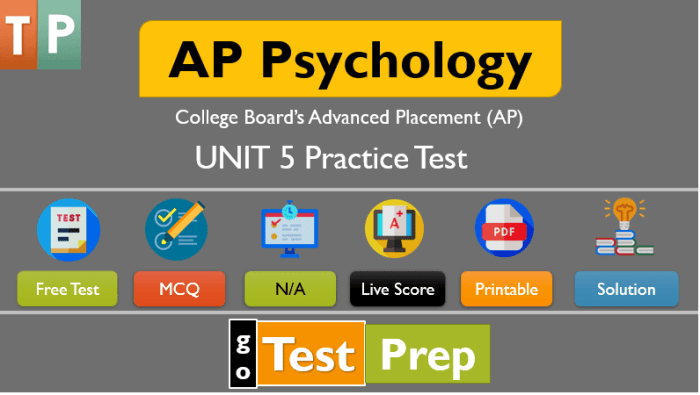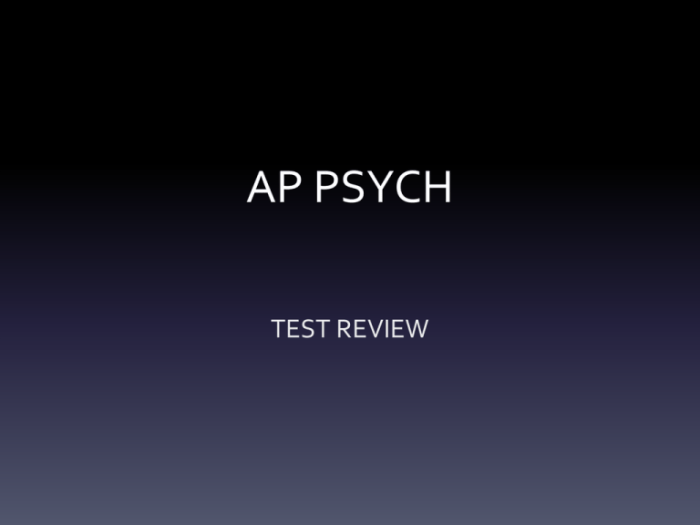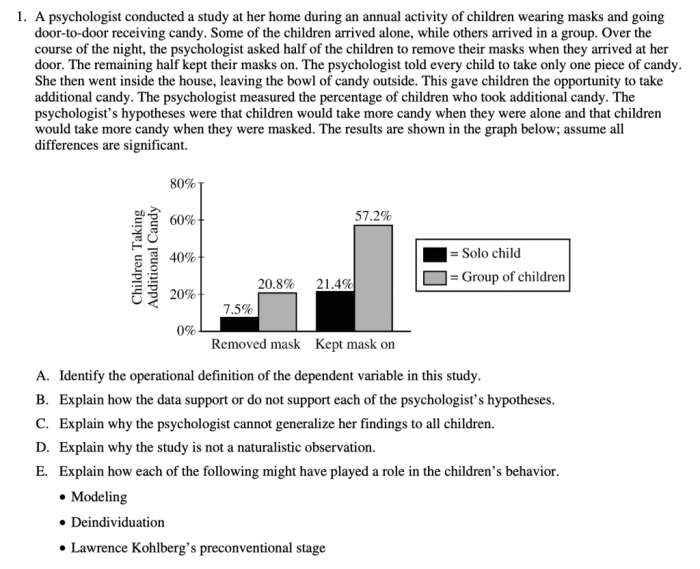Unit 2 ap psych practice test – Embark on a comprehensive journey with our Unit 2 AP Psychology Practice Test, meticulously crafted to guide you towards exam success. This practice test mirrors the structure and content of the actual exam, providing you with an invaluable opportunity to assess your understanding, identify areas for improvement, and boost your confidence.
Delve into the intricacies of psychological concepts, master multiple-choice questions, and hone your essay-writing skills. Our practice test empowers you with the knowledge and strategies to excel in Unit 2 and achieve your academic goals.
Unit 2 AP Psychology Practice Test: Unit 2 Ap Psych Practice Test

This practice test is designed to help you prepare for the Unit 2 exam of the Advanced Placement Psychology course. It covers the following topics:
- Biological Bases of Behavior
- Sensation and Perception
- Learning
- Cognition
- Motivation and Emotion
The test consists of 50 multiple-choice questions. Each question is worth one point. The test is timed, and you will have 60 minutes to complete it.
Biological Bases of Behavior
This section covers the biological underpinnings of behavior, including the structure and function of the nervous system, the endocrine system, and the genetic basis of behavior.
- The nervous system is composed of the brain, spinal cord, and peripheral nerves.
- The brain is divided into two hemispheres, each of which is responsible for different functions.
- The endocrine system is composed of glands that secrete hormones into the bloodstream.
- Genes play a role in determining our physical characteristics, our personality, and our behavior.
Content Covered in the Practice Test
This practice test covers the core content areas of Unit 2 of the AP Psychology curriculum. These areas encompass the foundational principles of psychology and provide a comprehensive overview of the field.
The test assesses students’ understanding of key concepts, theories, and research methods in psychology, emphasizing their application and relevance to real-world scenarios.
Biological Bases of Behavior
This section explores the biological underpinnings of behavior, focusing on the structure and function of the nervous system, hormones, and genetics.
It constitutes a significant portion of the test, highlighting the interplay between biological processes and psychological experiences.
Sensation and Perception
This section examines how we receive and interpret sensory information from our environment.
It covers topics such as sensory receptors, perceptual organization, and the influence of attention on perception, accounting for a substantial portion of the test.
Learning
This section investigates the processes by which we acquire new knowledge and skills.
It explores different types of learning, including classical conditioning, operant conditioning, and observational learning, and their applications in various settings.
Memory
This section delves into the mechanisms of memory, including encoding, storage, and retrieval.
It emphasizes the different types of memory, such as short-term and long-term memory, and their role in cognitive processes.
Cognition
This section focuses on higher-level cognitive processes, such as attention, problem-solving, decision-making, and language.
It examines the neural basis of these processes and their impact on our interactions with the world.
Motivation and Emotion
This section explores the factors that drive our behavior and the psychological experiences associated with them.
It covers topics such as motivation theories, emotional regulation, and the influence of culture on emotional expression.
Development
This section examines the physical, cognitive, and social changes that occur throughout the lifespan.
It traces the developmental trajectory from infancy to adolescence and adulthood, highlighting the key milestones and challenges at each stage.
Personality
This section investigates the unique characteristics and traits that define individuals.
It explores different personality theories, including psychodynamic, behavioral, and humanistic perspectives, and their implications for understanding human behavior.
Social Psychology
This section examines the influence of social factors on our thoughts, feelings, and behaviors.
For the unit 2 AP Psych practice test, you might need to brush up on some basic math concepts. For example, if you’re asked to calculate the perimeter of a triangle, you’ll need to know the formula. Luckily, you can find plenty of resources online that can help you with this, such as this article . Once you’ve reviewed the basics, you’ll be well-prepared for the test.
It covers topics such as social cognition, conformity, obedience, and prejudice, highlighting the complex interplay between the individual and the social environment.
Psychological Disorders
This section explores the classification, diagnosis, and treatment of psychological disorders.
It provides an overview of the major categories of disorders, including anxiety disorders, mood disorders, and psychotic disorders, and discusses the various therapeutic approaches used to address them.
Practice Questions and Answer Key

This section provides practice questions to test your understanding of the concepts covered in Unit 2 of AP Psychology. The questions are designed to be representative of the types of questions you may encounter on the actual AP exam. Each question is followed by answer choices and a correct answer.
Detailed explanations are provided for each correct answer, highlighting the relevant psychological concepts.
The practice questions are organized into the following s:
- Research Methods
- Biological Bases of Behavior
- Sensation and Perception
- Learning
- Memory
We recommend that you complete the practice questions in order to assess your strengths and weaknesses. The detailed explanations will help you to reinforce your understanding of the material and identify areas where you need additional review.
Research Methods, Unit 2 ap psych practice test
The following practice questions cover the concepts of research methods in psychology, including experimental design, data analysis, and ethical considerations.
| Practice Question | Answer Choices | Correct Answer |
|---|---|---|
| Which of the following is NOT a characteristic of a well-designed experiment? |
|
|
| Which of the following statistical tests is used to determine if there is a significant difference between two groups? |
|
|
| Which of the following ethical principles requires researchers to protect the privacy of participants? |
|
|
Detailed Explanations:
- a. t-test:The t-test is a statistical test used to determine if there is a significant difference between the means of two groups. It is commonly used in research to compare the effectiveness of different treatments or interventions.
- b. Confidentiality:Confidentiality refers to the ethical principle that requires researchers to protect the privacy of participants. This means that researchers must keep the information they collect about participants confidential and not share it with anyone else without their consent.
Study Tips and Strategies

To maximize your performance on the practice test, effective preparation is crucial. This involves reviewing the course material thoroughly, understanding the question formats, and developing strategies for managing your time efficiently.
Reviewing Content
Begin by creating a study schedule that allows ample time for reviewing all the covered concepts. Use your textbooks, notes, and any other available resources to refresh your memory on key terms, theories, and research findings. Consider creating flashcards or using online quizzes to test your understanding and identify areas where you need further reinforcement.
Answering Multiple-Choice Questions
Practice answering multiple-choice questions to familiarize yourself with the question formats and develop effective strategies. Read each question carefully and identify the main idea or concept being tested. Eliminate any obviously incorrect options and focus on the remaining choices. Pay attention to key words and phrases that indicate the correct answer.
Managing Time
Time management is essential during the practice test. Allocate a specific amount of time to each section and stick to it. Use the remaining time to review your answers and make any necessary corrections. Avoid spending too much time on any one question; if you’re unsure, mark it for later review and move on.
Sample Essay Questions and Grading Rubric

This section provides sample essay questions aligned with the content covered in Unit 2 and a grading rubric for evaluating student responses. Specific examples of high-quality and low-quality responses are included for reference.
Sample Essay Questions
- Discuss the role of biological factors in the development of psychological disorders.
- Analyze the impact of cultural and social factors on the diagnosis and treatment of mental illness.
- Evaluate the effectiveness of different treatment approaches for psychological disorders.
Grading Rubric
The following criteria will be used to evaluate student responses:
- Content:Accuracy and depth of knowledge demonstrated in the response.
- Organization:Logical flow and structure of the response.
- Clarity:Use of precise and concise language.
- Evidence:Support for claims with relevant examples and research findings.
- Analysis:Critical thinking and insights into the topic.
Specific Examples
High-Quality Response:
In a well-organized essay, the student demonstrates a comprehensive understanding of the role of biological factors in the development of psychological disorders. They provide specific examples of genetic, neurochemical, and physiological factors that contribute to the onset of various mental illnesses.
The response is supported by research findings and includes insightful analysis of the interactions between biological and environmental factors.
Low-Quality Response:
In a disorganized essay, the student provides a superficial overview of biological factors without offering specific examples or evidence. The response lacks clarity and logical flow, making it difficult to follow the student’s train of thought. The student fails to analyze the role of biological factors in the development of psychological disorders, simply stating that they play a “significant role.”
Key Questions Answered
What is the purpose of this practice test?
This practice test is designed to provide students with an opportunity to assess their understanding of the content covered in Unit 2 of the AP Psychology curriculum and to identify areas where they may need additional study.
How is the practice test structured?
The practice test consists of multiple-choice questions and essay questions that cover the major content areas of Unit 2 of the AP Psychology curriculum.
How can I use this practice test to prepare for the actual exam?
Students can use this practice test to identify areas where they need additional study and to practice answering multiple-choice and essay questions in a timed setting.